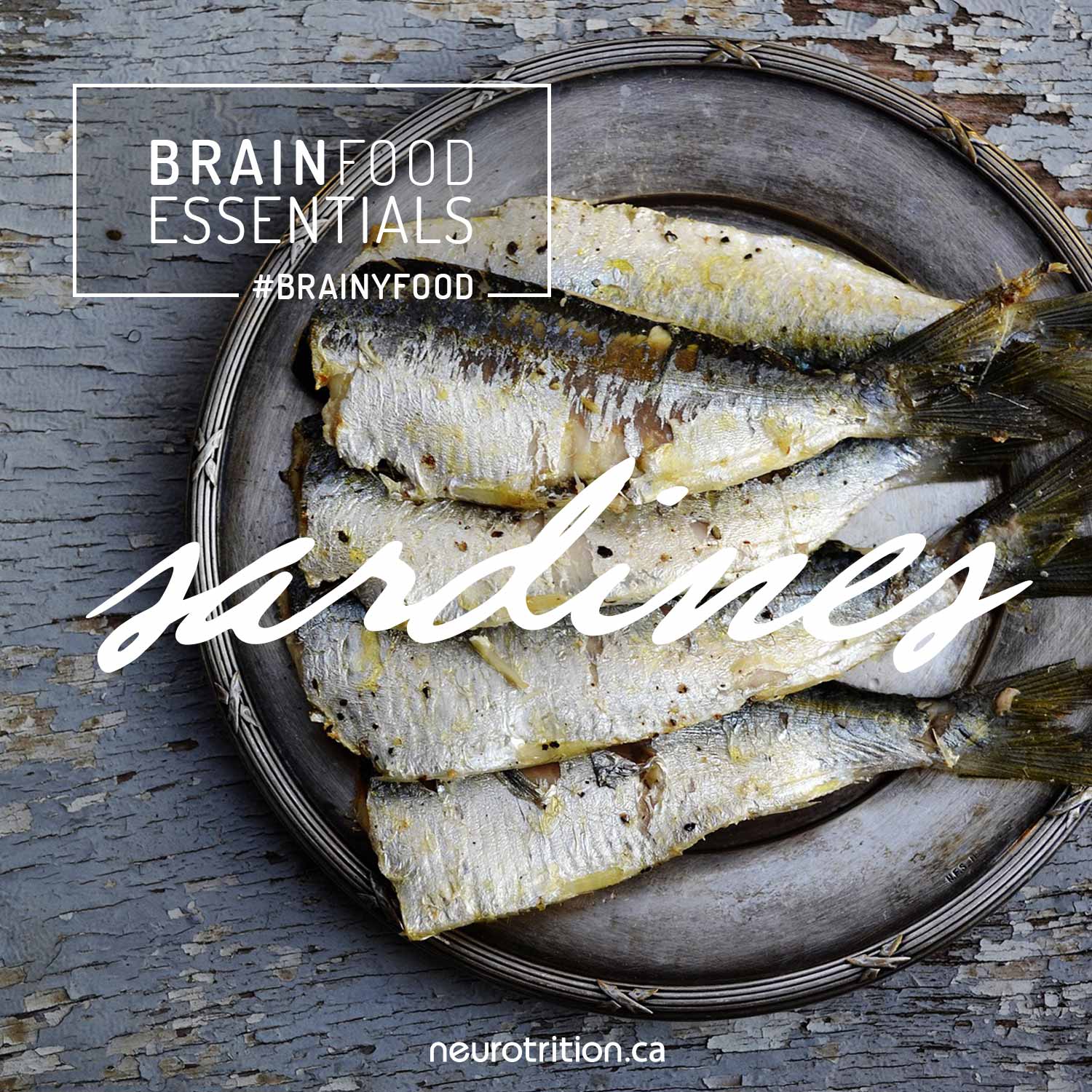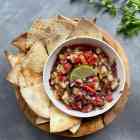Brain Food Essentials: Sardines

“Fish is brain food.”
You may have heard this before.
And we at NeuroTrition completely agree.
The thought of “fish” may conjure up visions of a perfectly grilled wild salmon steak. Or an amazing pan-seared halibut or trout.
But, have you thought of sardines as brain food?
We know not everyone loves sardines (do you have your guard up against ‘em?). But, not everyone wants and can afford some of the more expensive fish with the same brain-building nutrients as these smaller fish. In fact, canned sardines are not only affordable versions of the same nutritional powerhouses some other fish are, but you don’t even need to cook ‘em! They are a favourite of our Neuro-Chefs who love to incorporate them into our Brain Food Menus.
Let’s unpack some of the science of sardines (and other small fish) to show you what truly makes them a “brain food essential.” Hint: it’s not just the omega-3s. And, of course, we’ll give you some great ideas on how you can incorporate more small fish like sardines into your diet. Maybe they’ll even become one of your favourites (we’ve even had kids approve them).
SMALL FISH BUILD STRONG BRAINS
Small fish like sardines, mackerel, and anchovies contain the same key brain-building nutrients found in larger fish.
And small fish have the added benefit of, well, being small.
Being small in a world of fish means you have fewer toxins because you avoid what’s known as “bioaccumulation.”
Being small in a world of fish means you have fewer toxins because you avoid what’s known as “bioaccumulation.” This is when compounds accumulate in animals because of what they eat. Unfortunately, these toxins come from the pollution that has been building up in our waters over time. They get from the water into the fish from the food those fish eat.
Here’s how bioaccumulation works. Picture a small sardine eating tiny marine organisms like plankton. Each sardine doesn’t need to eat too much plankton in their lifetime. They don’t grow very large, and they don’t live very long. This limits the chance of building up too many toxins in their bodies from their food.
Now picture a larger fish like tuna who eat a lot of small fish because they grow larger and live longer. So those tiny amounts of toxins that get into the small fish can accumulate in the larger fish over time.
This is particularly important when it comes to brain health. Some of these toxins found in fish (e.g. mercury, pesticides, etc.) negatively affect the brain and nervous system.
Don’t get us wrong, many large fish are definitely brain foods! But we recommend that when you eat large fish, choose “wild” whenever possible because they have fewer toxins than farmed fish.
So don’t give up your beautiful salmon, halibut, black cod or trout; just opt for “wild” fish (or even sardines?) whenever you can.
Tests have shown that sardine oil can activate the cerebral cortex of the brain. This is the outside part of the brain that controls memory, attention, thought, and language.
In fact, sardine oil can help improve memory in elderly people, and may help reduce risk of age-related cognitive decline (i.e. Alzheimer’s). Tests have shown that sardine oil can activate the cerebral cortex of the brain. This is the outside part of the brain that controls memory, attention, thought, and language. It’s great to “turn on” your cerebral cortex because it can help keep your memory sharp well into old age. And who doesn’t want that?
Are you starting to see sardines as brain food?
Let’s dive into the nutrition in sardines.
BRAIN LOVIN’ OMEGA-3S
Your brain is 60% fat, and omega-3s are an essential fat that is critical for optimal brain health. There are plenty of omega-3s in sardines, particularly DHA (docosahexaenoic acid) and EPA (eicosapentaenoic acid).
Did you know that DHA gets incorporated right into our brain cells? In fact, DHA is a key player for brain and mental health for all ages from infancy to elderly.
The other main omega-3 in sardines, EPA, fights inflammation, which is great for your brain and mental health. Not to mention the rest of your body.
Omega-3s are amazing brainy nutrients. But sardines pack a bigger nutritional punch than that.
NOT JUST OMEGA-3S
One can of sardines has almost half of your daily requirement of vitamin D. And vitamin D supports mental health, memory, and cognitive health (ability to think).
Selenium is another nutrient found in small fish like sardines. Selenium is an antioxidant trace mineral, which means that you only need a small (i.e. “trace”) amount of it. Having enough selenium may help to reduce inflammation, improve moods, as well as lower the risk of epileptic seizures.
And don’t forget that eating the bones of the fish also provides calcium and phosphorus. These essential minerals help your nerves communicate with each other.
One can of sardines has a third of your daily calcium, as well as more than half of your daily phosphorus requirements.
So you can see, sardines are an essential brain food, full of NeuroTrition-approved nutrients.
6 TASTY WAYS TO ENJOY SARDINES (AND OTHER SMALL FISH)
Some people may prefer a lovely salmon, halibut, black cod or trout fillet. But, sardines can be a tasty, budget-friendly, and easy to use (right out of the can) brain food too.
NeuroTrition Rx: BPA (bisphenol-A) is a substance used to line metal food cans, including those of sardines. It has been linked with health concerns, such as obesity, diabetes, and cancers. We recommend BPA-free cans whenever possible. If your local grocery store is not carrying BPA-free sardines, ask them to start!
- Top your green salad with them. If you’re looking for a protein to add to your greens, look no further than the can of sardines in your pantry.
- Have them in a sandwich, or on crackers. Add sliced cucumbers, bell peppers and/or black olives to top it off.
- Make a “sardine salad” by chopping them up and mixing with chopped veggies like celery & bell pepper, unsweetened Greek yogurt, mustard, and paprika. Or mix them with our homemade, healthy (seriously!) mayo, here.
- Have you tried fish tacos? They’re one of Orsha’s (NeuroTrition founder & CEO) absolute favourites. Why not try them with sardines? Bonus: you won’t even need to cook them.
- Swap out the shrimp or salmon in your stir fry for sardines.
- Top a baked sweet potato with chopped sardines and salsa or our delicious crema recipe, here.
Go ahead! Add some small fish like sardines into your diet. You’ll get not only the brain lovin’ omega-3 fats, but also essential vitamins and minerals for your brain and mental health.
They’re definitely nutritious, and they absolutely can be delicious! They are a NeuroTrition favourite. Once you try them, they might become your favourite too!
- References
-
- Ashrafi, M.R., Shams, S., Nouri, M., Mohseni, M., Shabanian, R., Yekaninejad, M.S., Chegini, N., Khodadad, A. & Safaralizadeh, R. (2007). A probable causative factor for an old problem: selenium and glutathione peroxidase appear to play important roles in epilepsy pathogenesis. Epilepsia. 48(9):1750-5.
- Föcker, M., Antel, J., Ring, S., Hahn, D., Kanal, Ö., Öztürk, D., Hebebrand, J. & Libuda, L. (2017). Vitamin D and mental health in children and adolescents. Eur Child Adolesc Psychiatry. doi: 10.1007/s00787-017-0949-3.
- Gassman, N.R. (2017). Induction of oxidative stress by bisphenol A and its pleiotropic effects. Environ Mol Mutagen. 58(2):60-71. doi: 10.1002/em.22072.
- Health Canada, Daily Reference Intakes, Reference Values for Elements. Accessed March 7, 2017.
- Konagai, C., Yanagimoto, K., Hayamizu, K., Han, L., Tsuji, T. & Koga, Y. (2013). Effects of krill oil containing n-3 polyunsaturated fatty acids in phospholipid form on human brain function: a randomized controlled trial in healthy elderly volunteers. Clin Interv Aging. 8:1247-57. doi: 10.2147/CIA.S50349.
- Kuźma, E. et al. (2016). Vitamin D and Memory Decline: Two Population-Based Prospective Studies. J Alzheimers Dis. 50(4):1099-108. doi: 10.3233/JAD-150811.
- Rayman, M.P. (2000). The importance of selenium to human health. Lancet. 356(9225):233-41.
- US Department of Agriculture, National Nutrient Database, Sardines. Accessed March 7, 2017.










